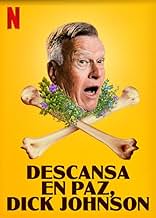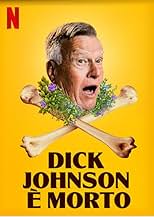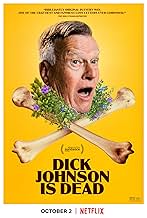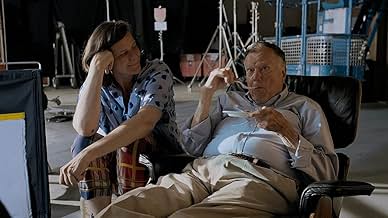IMDb-BEWERTUNG
7,4/10
7501
IHRE BEWERTUNG
Kirsten Johnson zieht sie alle Register ihrer filmischen Möglichkeiten, um einfallsreiche und fantasievolle Möglichkeiten zu inszenieren, wie ihr 86-jähriger Vater, ein ehemaliger Psychiater... Alles lesenKirsten Johnson zieht sie alle Register ihrer filmischen Möglichkeiten, um einfallsreiche und fantasievolle Möglichkeiten zu inszenieren, wie ihr 86-jähriger Vater, ein ehemaliger Psychiater, eines Tages sterben könnte.Kirsten Johnson zieht sie alle Register ihrer filmischen Möglichkeiten, um einfallsreiche und fantasievolle Möglichkeiten zu inszenieren, wie ihr 86-jähriger Vater, ein ehemaliger Psychiater, eines Tages sterben könnte.
- Regie
- Drehbuch
- Hauptbesetzung
- 1 Primetime Emmy gewonnen
- 19 Gewinne & 40 Nominierungen insgesamt
Empfohlene Bewertungen
In what I think of as one of the greatest TV series of all time, The Leftovers, the show asks how we cope in the face of death, how the living keep going when there are no answers.
In the docu-drama-hagiography-family-portrait Dick Johnson Is Dead, Kirsten Johnson is asking herself those same questions in the knowledge that her 86 year old father, Dick, has Alzheimer's. Having watched her mother's slow decline and disappearance due to the same disease, she knows the terrible fate that is coming, and she decides to record these final years with her dad as he is, as she wants to remember him.
The answers Dick Johnson is Dead comes up with are a far cry from the grieving tone struck by The Leftovers. If you read the above and thought "Well that's going to be depressing"; you could not be more wrong. It is, of course, tinged with the anticipation of grief, but what shines through clearer than anything is the love Kirsten and Dick have for each other, and his unflappable, can-do spirit. This film is a celebration of the time that they have together, even though it may be ending.
Laced throughout footage of Dick selling up his house, packing up his office, and moving in with his daughter are strange fantasy sequences in which Kirsten stages her fathers death in a variety of ways. Some are outrageous, some are sad, but we are never asked to believe in them - throughout it is clear they are manufactured, and their purpose is to help Kirsten, and the audience, to imagine what it will be like when Dick finally does succumb to the inevitable. There are also fantasy sequences in which Dick imagines what it might be like when he arrives in heaven, with his wife, Freud, and Bruce Lee all waiting for him.
It's a bizarre choice that pays off handsomely. Death is always with us but we rarely look straight at it. Kirsten and Dick make a courageous decision acknowledge it, talk about it, visualise it. It suggests, despite our fears, that we can handle the worst life will throw at us. Principally though, this is a picture of a father and a daughter, of their quirky ways, and of the bonds that bind them.
The Leftovers ultimately suggested we are terribly alone in the universe, and we must fight hard to grab what life and love we can when we have the chance. Dick Johnson is Dead suggests that love is here with us right now, and we have only to open our eyes to see (and maybe make a home movie of) every precious second.
The answers Dick Johnson is Dead comes up with are a far cry from the grieving tone struck by The Leftovers. If you read the above and thought "Well that's going to be depressing"; you could not be more wrong. It is, of course, tinged with the anticipation of grief, but what shines through clearer than anything is the love Kirsten and Dick have for each other, and his unflappable, can-do spirit. This film is a celebration of the time that they have together, even though it may be ending.
Laced throughout footage of Dick selling up his house, packing up his office, and moving in with his daughter are strange fantasy sequences in which Kirsten stages her fathers death in a variety of ways. Some are outrageous, some are sad, but we are never asked to believe in them - throughout it is clear they are manufactured, and their purpose is to help Kirsten, and the audience, to imagine what it will be like when Dick finally does succumb to the inevitable. There are also fantasy sequences in which Dick imagines what it might be like when he arrives in heaven, with his wife, Freud, and Bruce Lee all waiting for him.
It's a bizarre choice that pays off handsomely. Death is always with us but we rarely look straight at it. Kirsten and Dick make a courageous decision acknowledge it, talk about it, visualise it. It suggests, despite our fears, that we can handle the worst life will throw at us. Principally though, this is a picture of a father and a daughter, of their quirky ways, and of the bonds that bind them.
The Leftovers ultimately suggested we are terribly alone in the universe, and we must fight hard to grab what life and love we can when we have the chance. Dick Johnson is Dead suggests that love is here with us right now, and we have only to open our eyes to see (and maybe make a home movie of) every precious second.
A thoughtful and heartfelt way to present the inherent aspect of life that is death
Dick Johnson seems like a very nice guy, and it was very nice of him to do this with his daughter. Kirsten Johnson seems like a very nice woman, and this film is like a valentine to her Dad. But now we come to the film itself, which I wanted to see because the overwhelming majority of professional critics loved it. And honestly, I have no idea why. While the film had its moments, much of it was pretty boring, especially the slow-motion fantasy sequences with glitter in the air.
This film kind of reminded me of Sarah Polley's, "Stories We Tell," which was another personal story about something that happened to her family. Good people, but unless you knew the family, I didn't think it was very interesting. Most film critics inexplicably loved that one too.
This film kind of reminded me of Sarah Polley's, "Stories We Tell," which was another personal story about something that happened to her family. Good people, but unless you knew the family, I didn't think it was very interesting. Most film critics inexplicably loved that one too.
Greetings again from the darkness. Hal Ashby's 1971 cult classic HAROLD AND MAUDE takes a comical look at death, and in the process shows us the importance of living, and the jolt delivered by dying. Documentarian Kirsten Johnson (CAMERAPERSON, 2016) makes this a more personal project by involving her dad in a series of staged deaths for her film. Initially the purpose was to help him begin to deal with an end that could be coming soon, but it evolved into something altogether different.
Dick Johnson is an elderly psychiatrist. He's a charming and lively man, boasting a nice sense of humor and a twinkle in his eye. His daughter Kristen is "a camera person", and suggests to him that they make a film about him dying. He's on board. Kristen then stages various "deaths" for her father. These scenes include getting crushed by a falling air-conditioner, getting hit by a car, taking a horrific fall down stairs, and a construction site mishap. The more we get to know Dick, the more we like him. We learn it's been 30 years since he had a heart attack, and 7 years since his wife died. She suffered from Alzheimer's for years before she passed. We learn he's a Seventh Day Adventist, and loves chocolate fudge cake. My how he loves chocolate cake.
Initially gung-ho for his daughter's idea, and fully supportive of the situations she puts him in for her art, Dick begins to show signs of forgetfulness and confusion. At times we have our doubts that he fully comprehends what's happening - not just in the film, but in everyday life. The comical elements shift to wistfulness, as we are present when Dick has to shut down his practice, sell his car, and ultimately box up his belongings and move out of his beloved home. Kristen moves him to her one bedroom New York City apartment, which is right next door to that of the two fathers of her children.
In addition to the staged deaths, we also meet a stuntman who gets involved, and we are on set for the filming of Dick's "Heaven" which includes chocolate and popcorn, and his "Last Supper" featuring, among others, Bruce Lee, Frieda Kahlo, Farrah Fawcett, and Frederick Douglass. There is also a family trip to a beach in Lisbon, and a reunion with Dick's college girlfriend in California. The strangest bit is the staged funeral, replete with Dick in a coffin, and friends offering tributes. We also celebrate Dick's 86th birthday, and see many family pictures and home videos.
Leonardo da Vinci is quoted: "As a well spent day brings happy sleep, so life well used brings happy death."
Watching Dick's spirit fade along with his memory is anything but happy. His daughter Kristen tries to remain sensitive to his changing state, but the feeling we are left with is anything but happiness towards death. Her film is likely structured much differently than she originally intended, but has so much value for discussion with loved ones and a reminder of just how precious life is for those who appreciate it. Now showing on Netflix
Dick Johnson is an elderly psychiatrist. He's a charming and lively man, boasting a nice sense of humor and a twinkle in his eye. His daughter Kristen is "a camera person", and suggests to him that they make a film about him dying. He's on board. Kristen then stages various "deaths" for her father. These scenes include getting crushed by a falling air-conditioner, getting hit by a car, taking a horrific fall down stairs, and a construction site mishap. The more we get to know Dick, the more we like him. We learn it's been 30 years since he had a heart attack, and 7 years since his wife died. She suffered from Alzheimer's for years before she passed. We learn he's a Seventh Day Adventist, and loves chocolate fudge cake. My how he loves chocolate cake.
Initially gung-ho for his daughter's idea, and fully supportive of the situations she puts him in for her art, Dick begins to show signs of forgetfulness and confusion. At times we have our doubts that he fully comprehends what's happening - not just in the film, but in everyday life. The comical elements shift to wistfulness, as we are present when Dick has to shut down his practice, sell his car, and ultimately box up his belongings and move out of his beloved home. Kristen moves him to her one bedroom New York City apartment, which is right next door to that of the two fathers of her children.
In addition to the staged deaths, we also meet a stuntman who gets involved, and we are on set for the filming of Dick's "Heaven" which includes chocolate and popcorn, and his "Last Supper" featuring, among others, Bruce Lee, Frieda Kahlo, Farrah Fawcett, and Frederick Douglass. There is also a family trip to a beach in Lisbon, and a reunion with Dick's college girlfriend in California. The strangest bit is the staged funeral, replete with Dick in a coffin, and friends offering tributes. We also celebrate Dick's 86th birthday, and see many family pictures and home videos.
Leonardo da Vinci is quoted: "As a well spent day brings happy sleep, so life well used brings happy death."
Watching Dick's spirit fade along with his memory is anything but happy. His daughter Kristen tries to remain sensitive to his changing state, but the feeling we are left with is anything but happiness towards death. Her film is likely structured much differently than she originally intended, but has so much value for discussion with loved ones and a reminder of just how precious life is for those who appreciate it. Now showing on Netflix
I rated this an 8 because, while it's not the world's best documentary, it is completely original, and thought-provoking despite its seeming simplicity. You'll fall in love with Dick Johnson as soon as you meet him, with his childlike, wide-open smile and merry eyes. That love only deepens throughout this funny and awe-inspiring film (for me, especially in the sneak-peeks into the filmmaking process, including the practice of various stuntmen hired to simulate Dick's deaths). The use of color is also highly entertaining, and the voice-over narration by the filmmaker (Dick's daughter) is concise and intelligent without being condescending to the viewer or mawkish about her dread of her father's decline and eventual demise. This film asks viewers how we'll all cope with the passing of a beloved parent, and prepare for our own unknown end.
Wusstest du schon
- WissenswertesWhen Kirsten Johnson pitched the idea to her father, she asked him, "Dad, what if we make a movie where we kill you over and over again until you really die? And he laughed".
- VerbindungenFeatures Nova: Day the Dinosaurs Died (2017)
- SoundtracksGloria in Excelsis Deo
Written by Antonio Vivaldi (as Antonio Lucio Vivaldi)
Arranged by Andrea Montepaone
Courtesy of Spirit Production Music
Top-Auswahl
Melde dich zum Bewerten an und greife auf die Watchlist für personalisierte Empfehlungen zu.
- How long is Dick Johnson Is Dead?Powered by Alexa
Details
- Erscheinungsdatum
- Herkunftsland
- Offizielle Standorte
- Sprache
- Auch bekannt als
- Dick Johnson Is Dead
- Drehorte
- Seattle, Washington, USA(workplace)
- Produktionsfirma
- Weitere beteiligte Unternehmen bei IMDbPro anzeigen
- Laufzeit1 Stunde 29 Minuten
- Farbe
- Sound-Mix
- Seitenverhältnis
- 1.78 : 1
Zu dieser Seite beitragen
Bearbeitung vorschlagen oder fehlenden Inhalt hinzufügen

Oberste Lücke
By what name was Dick Johnson ist tot (2020) officially released in India in Hindi?
Antwort





























